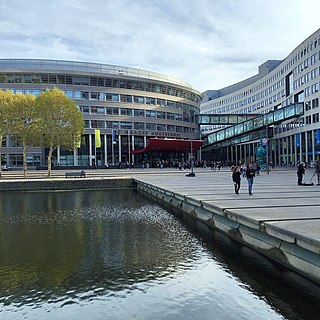
The University for Peace (UPEACE) is an international graduate-only university and intergovernmental organization. The university was established as a treaty organisation by the United Nations General Assembly in 1980.

Vocational education is education that prepares people for a skilled craft as an artisan, trade as a tradesperson, or work as a technician. Vocational education can also be seen as that type of education given to an individual to prepare that individual to be gainfully employed or self employed with requisite skill. Vocational education is known by a variety of names, depending on the country concerned, including career and technical education, or acronyms such as TVET and TAFE.

Apprenticeship is a system for training a new generation of practitioners of a trade or profession with on-the-job training and often some accompanying study. Apprenticeships can also enable practitioners to gain a license to practice in a regulated occupation. Most of their training is done while working for an employer who helps the apprentices learn their trade or profession, in exchange for their continued labor for an agreed period after they have achieved measurable competencies.
Further education in the United Kingdom and Ireland is additional education to that received at secondary school that is distinct from the higher education (HE) offered in universities and other academic institutions. It may be at any level in compulsory secondary education, from entry to higher level qualifications such as awards, certificates, diplomas and other vocational, competency-based qualifications through awarding organisations including City and Guilds, Edexcel (BTEC) and OCR. FE colleges may also offer HE qualifications such as HNC, HND, foundation degree or PGCE. The colleges are also a large service provider for apprenticeships where most of the training takes place at the apprentices' workplace, supplemented with day release into college.
Maastricht University is a public research university in Maastricht, Netherlands. Founded in 1976, it is the second youngest of the thirteen Dutch universities.

The Royal Academy of Dance (RAD) is a UK-based examination board specialising in dance education and training, with an emphasis on classical ballet. The RAD was founded in London, England in 1920 as the Association of Teachers of Operatic Dancing, and was granted a Royal Charter in 1935. Queen Elizabeth II was patron of the RAD and Darcey Bussell was elected to serve as president in 2012, succeeding Antoinette Sibley who served for 21 years.

The Geographical Association (GA) is an association in the United Kingdom. The organisation has a stated aim of improving geographical knowledge of the public through promoting geographical education.

Education in Mauritius is managed by the Ministry of Education & Human Resources, which controls the development and administration of state schools funded by government, but also has an advisory and supervisory role in respect of private schools. The Tertiary education is maintained by the Ministry of Tertiary Education, Science, Research and Technology. The government of Mauritius provides free education to its citizens from pre-primary to tertiary levels. Since July 2005, the government also introduced free transport for all students. Schooling is compulsory up to the age of 16. Mauritian students consistently rank top in the world each year for the Cambridge International O Level, International A and AS level examinations. Among sub-Saharan African countries, Mauritius has one of the highest literacy rates. The adult literacy rate was at 91.9% in 2022. According to the 2022 census, the proportion of people with higher education has increased to 8.8%. Mauritius was ranked 57th in the Global Innovation Index in 2023, 1st in Africa.

West Lothian College is a further and higher education institution in Livingston, West Lothian, Scotland. The Principal of the college is Jackie Galbraith, who was previously Vice-Principal at Ayrshire College.
Interreg is a series of programmes to stimulate cooperation between regions in and out of the European Union (EU), funded by the European Regional Development Fund. The first Interreg started in 1989. Interreg IV covered the period 2007–2013. Interreg V (2014–2020) covers all 27 EU member states, the EFTA countries, six accession countries and 18 neighbouring countries. It has a budget of EUR 10.1 billion, which represents 2.8% of the total of the European Cohesion Policy budget. Since the non EU countries don't pay EU membership fee, they contribute directly to Interreg, not through ERDF.

Gateshead College is a further education college in the town of Gateshead, England. It offers further education for 16-18 year olds as well as higher education, apprenticeships, parti-time adult learning and training for employers. Established on November 15, 1955 at Durham Road in Low Fell, Gateshead, it was closed in January 2008 for its displacement to the new main site located at the Baltic Quayside in Gateshead.

The Hague University of Applied Sciences is a university of applied sciences with its campuses located in and around The Hague in the Randstad metropolitan region in the west of the Netherlands. The city is home to the Dutch government, royal family and many major international legal, security and peace institutions. Since the university was founded in 1987 it has expanded to four campuses in the near-side cities of The Hague, Delft and Zoetermeer. The main campus in The Hague is located behind The Hague Hollands Spoor railway station by the Laakhaven Canal.
Swisscontact – Swiss Foundation for Technical Cooperation is a Swiss non-profit-organisation, which carries out projects aiming at reducing poverty in developing and transition countries by private sector development. It has been founded in 1959 as a politically and denominationally neutral organisation and has 60 employees in Switzerland and approximately 1,400 staff abroad. The main fields of activity are fostering skills development, small and medium enterprises, financial services and resource efficiency.

Originally registered as the Institution of Welding Engineers in 1923, The Welding Institute has grown and changed over the intervening decades, yet maintains a specialisation in welding, joining and allied technologies.

The European Inter-University Centre for Human Rights and Democratisation (EIUC) is an interdisciplinary centre covering the area of human rights education and research formed by 41 universities from all European Union member states. The EIUC's activities include interdisciplinary education of students worldwide; developing training for senior officials of international organisations, field personnel, and other human rights professionals; identifying means of transferring academic expertise to the public, such as using visual arts and mass media; creating an environment for research cooperation; representing a network of graduates of the European Master's Programme in Human Rights and Democratisation. The centre is housed in the Monastery of San Nicolò al Lido which has been made available to the EIUC by the Municipality of Venice, Italy.
Henshaws Society for Blind People is a specialist charity providing support, advice and training to anyone affected by sight loss and other disabilities.

The Vocational Training Council (VTC) is the largest vocational education, training and professional development group in Hong Kong. Established in 1982, the VTC provides valuable credentials for some 250,000 students each year through a full range of pre-employment and in-service programmes with internationally recognised qualifications.

Tertiary education in New Zealand is provided by universities, institutes of technology and polytechnics, private training establishments, industry training organisations, and wānanga. It ranges from informal non-assessed community courses in schools through to undergraduate degrees and research-based postgraduate degrees. All post-compulsory education is regulated within the New Zealand Qualifications Framework, a unified system of national qualifications for schools, vocational education and training, and 'higher' education. The New Zealand Qualifications Authority (NZQA) is responsible for quality assuring all courses and tertiary education organisations other than universities. Under the Education Act 1989, The Committee on University Academic Programmes (CUAP) and the Academic Quality Agency (AQA) have delegated authority for quality assurance of university education. The Tertiary Education Commission (TEC) is responsible for administering the funding of tertiary education, primarily through negotiated investment plans with each funded organisation.

The University of Public Service is a higher educational institution in Budapest, Hungary. Established in 2012, it is one of the youngest universities in Central and Eastern Europe; however, its faculties as former independent colleges look back much earlier.

The GW4 Alliance is a consortium of four research intensive universities in South West England and Wales. It was formed in January 2013 by the universities of Bath, Bristol, Cardiff and Exeter to enhance research collaboration and innovation, and launched at the House of Commons in October 2014. It is the UK's first pan-regional partnership, involving an institution from a devolved nation.














